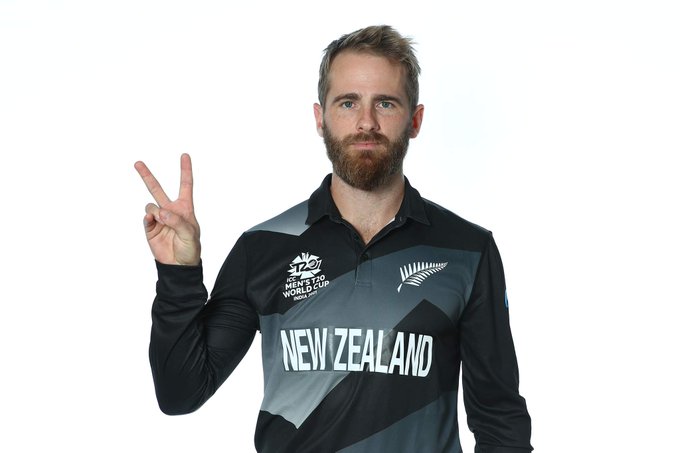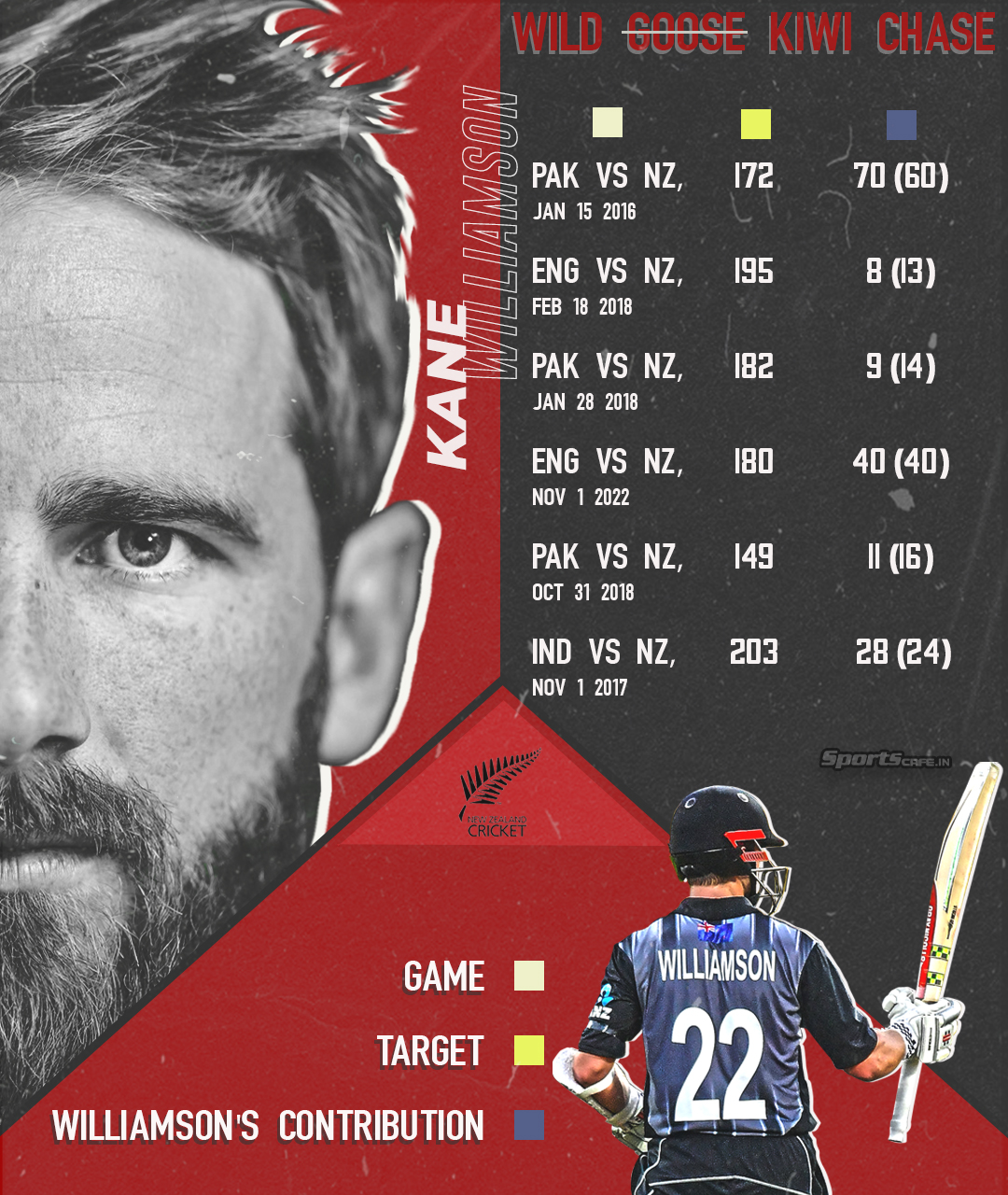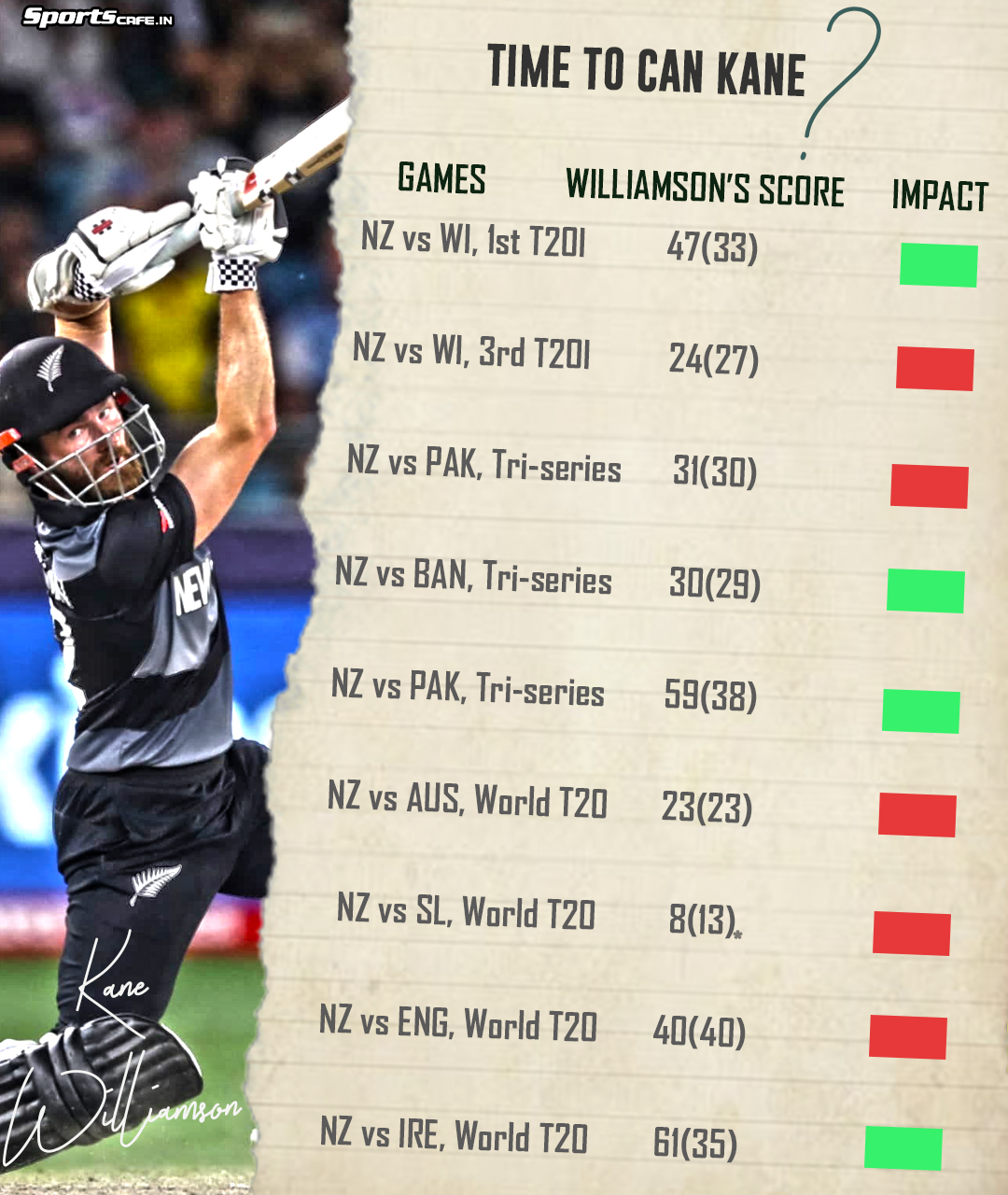Kane Williamson: The anchor that is sinking the Kiwi ship
Reputation and resume can only compensate for ruts till a time before they are doomed to bring you to ruin. Kane Williamson is finding it harder and harder to justify his presence in the Kiwi T20I side and the time may have finally come to bring the relationship to an amicable close.

Anchors. Heavy metal devices used to secure ships on shores, enabling them to battle the winds and rains without getting stranded out in the cold all on their own. And when the right time arrives, they let loose and push the vessel towards its destination, providing resilience and comfort against the fear of the unknown.
The anchors in T20 cricket are no different. They steady the team while setting forth on the long journey and then allow the side to spread its wings, once it has the confidence that there is enough stability to float.
But what if the anchor refuses to let go? What if once the ship has set sail, the anchor gets too heavy in deep waters and drags the ship towards the bed, sinking all its hopes and ambitions? What if anchors transition from being a security instrument to a self-harming weapon, capable of destroying its carrier from the inside?
This conversation around anchors in T20 cricket has hogged the spotlight in recent times, largely because of the inability to quantify the impact the role has on a team. One thing seems to be clear though - just like a ship can't function without an anchor, a team cannot attain glory without a batsman capable of playing the increasingly-vilified role. No team has ever won a World T20 without an anchor in its lineup – be it Mahela Jayawardene and Kumar Sangakkara steadying the ship for Sri Lanka in 2014 or Steven Smith and Aaron Finch providing comfort up top for the Kangaroos in 2021. Even the all-destructive gung-ho cricket-loving West Indies relied on Marlon Samuels to guide them to the title in 2016.
A figure that has become central to the debate around anchors is New Zealand skipper Kane Williamson. His dwindling returns have raised some questions over an anchor’s utility, but in all fairness, it is his form that needs to be truly put under the scanner rather than the role itself. After all, fellow anchor Devon Conway thrives in the same team setup, asserting the Kiwi skipper has simply failed to live up to the changing demands of the game.
Williamson has never had great numbers throughout his T20I career. While his career average of 32.73 makes one sit up and take notice, his strike rate of 123.46 makes the same person sink ever deeper into the same seat. Nevertheless, such returns were considered good around the time the Kiwi made his debut a decade ago but even though the game has evolved significantly since, the batter’s statistics have failed to catch up with the trend. Anchors are no longer limited to just biding their time at the crease and hoping the batter at the other end deals all the damage. They now also carry the onus of accelerating themselves when the innings approaches the death.
.png)
 Kane Williamson's numbers no longer compare to the norm in T20Is ©
Kane Williamson's numbers no longer compare to the norm in T20Is © A direct comparison with his counterparts is enough to underline the fact that Williamson’s contributions are ordinary at best and abysmal at worst. Even though the Kiwi has a strike rate of 170+ in the death overs in the first innings, he averages a paltry 12. In fact, his average contribution in the death is 13(8), including a dot ball every four or five deliveries and fewer than two boundaries a game. Kane has only managed eight not-outs in the 33 times he has survived beyond the 15-over mark, implying he used up the middle overs to get set while striking at just 120 with the hope of switching gears towards the end, only to end up disappointing.
In comparison, Virat Kohli and Mohammad Rizwan average comfortably over 40 in the death in the first innings while hitting runs at a strike rate of 180. Their dot ball percentage is well below 20%, over ten points better than the batter from Tauranga. Since 2016 alone, Kane’s failures or low strike rates can be held responsible for at least seven T20I defeats for the Black Caps.
.png)
 Virat Kohli and Mohammad Rizwan's numbers at the death make it evident they play a different role to Kane Williamson altogether in practice ©
Virat Kohli and Mohammad Rizwan's numbers at the death make it evident they play a different role to Kane Williamson altogether in practice © Kane’s numbers have worsened even further in 2022 as he has endured a terrible run of form for the most part. The batter has a sub-par strike rate of 120.43 and has only managed a couple of impressive innings, mostly impacting his team negatively in the other encounters. In 7 of the 10 T20I innings this year where he has faced a minimum of five balls, Williamson has had a strike below 105, with three of them explicitly being the reason behind his team’s narrow defeats during run chases.

 Kane Williamson has played a direct hand in a plethora of losing run chases for the Kiwis ©
Kane Williamson has played a direct hand in a plethora of losing run chases for the Kiwis © Even though the Kiwi did redeem himself partially with a well-struck half-century against Ireland in their last Super 12 encounter, the performance seemed ominously pyrrhic from a New Zealand perspective. To underline how poor he had been previously, Williamson's strike rate at the marquee event still only reads 118.91 despite a knock 61(35). Even in the latest edition of the Indian Premier League, Kane had a Cricviz impact score of -85, the worst of any player in the entire tournament.

 Kane Williamson does not provide the impetus anymore needed to his team from a number three batsman ©
Kane Williamson does not provide the impetus anymore needed to his team from a number three batsman © One reason why New Zealand have been able to bear Williamson’s presence in the team for so long is their brilliant bowling attack and a reliable pack of batters around him. A fearsome pack of Trent Boult, Tim Southee and Lockie Ferguson ensures the team the room to miss out on a few runs while batting, a model England was reliant on when they had Joe Root in the squad. However, once their attack weakened, Dawid Malan was integrated into the side instead to have an additional dose of explosiveness. In a similar vein, constant failures from Australia’s middle order have forced Australia’s hand to exclude Steven Smith from the lineup, given they already have an anchor in Aaron Finch, and opt for the blockbuster Tim David instead. Thus, the fact that Boult and Southee’s departure from the team is imminent begs the question of what Kane’s future holds, and whether their departure will be the final nail in his coffin.
All that being said, Williamson still holds the crucial captaincy role, one he excels in.
The 32-year-old is considered a hero in his nation and for good reason, having led them to great success in ICC tournaments albeit without any silverware.
The Black Caps, boasting the perpetual tag of underdogs, steamed to the final in the World T20 last year and have again booked their spot in the semi-finals in the ongoing edition as the group winners. He has a win rate of over 50% as captain in T20Is, a number that surges to 75% in World T20s on the back of just three losses in 16 games in the tournament.
Nevertheless, despite a dearth of senior figures in the team at the moment who can take over the captaincy of New Zealand without much ado, the Kiwis do have a more than capable leader in Mitchell Santner. The all-rounder has already led the team on 10 occasions in T20Is, losing just once in the process. There’s also Tim Southee albeit his days at the top seem numbered given his age, even though his performances hardly betray the fact that he is 33 years old.
At the end of the day, the onus lies on New Zealand Cricket and whether they have the guts to make the bold decision of dropping perhaps the greatest batsmen in their history from the game’s shortest format. The Kiwis have not had to encounter such a dilemma for ages given both their previous long-term captains bowed out while still on top. Brendon McCullum was still as lethal as ever during his final stint, while Vettori’s injury-ridden departure from Tests was on his own accord as was his last farewell following a stellar 2015 World Cup.
The Kane Williamson-New Zealand pairing just seems to work on paper – the 32-year-old is well and truly the face of cricket in the country. It’s the same thing as a MS Dhoni continuing to ply his trade for the Chennai Super Kings or a Mashrafe Mortaza refusing to back down for the Tigers. From a sporting perspective, it seems beyond certain that the islanders need Kane Williamson to bid adieu to T20Is and focus on the formats he excels in. Yet, the Kiwi’s influence as a leader and the role of being a poster boy of New Zealand’s ‘nice guys’ persona makes him hard to discard from the team. Ultimately, Williamson is a generational talent and if his exclusion does not bring the Black Caps success, it can bring a lot of flak for the decision-makers further complicating the decision. Thus, only time will tell whether New Zealand manage to throw the anchor off the board or just be content with it weighing them down.

Comments
Sign up or log in to your account to leave comments and reactions
0 Comments